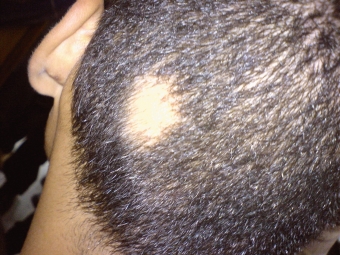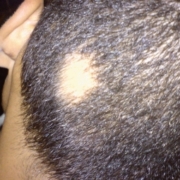Alopecia Areata: Questions and Answers
 ALOPECIA AREATA. Perhaps you noticed a small, round bald spot on the back of your head while you were washing your hair. Or, as you were preparing to shave your legs, you saw a patch of smooth, hairless skin on your calf. Both scenarios and many others could be the first signs of alopecia areata.
ALOPECIA AREATA. Perhaps you noticed a small, round bald spot on the back of your head while you were washing your hair. Or, as you were preparing to shave your legs, you saw a patch of smooth, hairless skin on your calf. Both scenarios and many others could be the first signs of alopecia areata.
If you or someone you love has unexplained hair loss, it could be alopecia areata. There is a lot of misinformation online and elsewhere about alopecia areata, which can increase anxiety for the people affected by this disease. Keeping yourself informed is a critical component to self-care, especially in the early stages.
What is Alopecia Areata and who gets it?
Alopecia areata is an autoimmune skin disease that results in hair loss anywhere on the body. The National Alopecia Areata Foundation reports that 2% of the population, approximately 4.5 million people, will be affected by the condition at some point in their lives. For some, symptoms present as small bald spots on the scalp and nothing else. Others experience complete scalp hair loss (alopecia totalis). Some report complete body hair loss (alopecia universalis). The National Institute of Arthritis and Musculoskeletal and Skin Diseases (NIAMS) reports that men and women of all races and ethnicities are susceptible to alopecia areata. However, individuals who have a family member with the condition have a greater chance of being affected by the disease with first onset usually occurring sometime during childhood.
What Causes Alopecia Areata?
According to NIAMS, hair loss from alopecia areata is believed to be caused by a person’s autoimmune system, specifically the white blood cells, attacking his or her hair follicles. The autoimmune system is designed to protect the body from viruses and other harmful bacteria. However, in the case of alopecia areata, the white blood cells mistakenly attack a healthy part of the body. When the hair follicles are attacked, they become smaller and reduce in production, which manifests as baldness or slow hair growth. Hair re-growth is possible in most cases since white blood cells usually fail to attack the cells that provide the hair follicle with new stems.
The National Alopecia Areata Foundation explains that it is not a nervous disorder. While reducing stress may help to improve overall mood, science demonstrates that it will not impact the course of alopecia areata.
How is Alopecia Areata Treated?
There is currently no cure for alopecia areata. According to Dr. Draelos, hair will re-grow and the symptoms will disappear temporarily or forever in approximately 50% of cases. When hair fails to re-grow, men and women may consider undergoing one or more of the many available treatments. Treatments range in effectiveness from person to person. The National Alopecia Areata Foundation reports that treatment is primarily based upon the age of the person and the type of alopecia with which he/she presents. As is the case with chronic medical conditions, treatments vary widely and are often prescribed in combination. Steroid injections, creams, and shampoos are often prescribed.
When hair loss is more severe, a wig or hair replacement system may be a solution. Wigs have received a bad reputation. And in many cases they deserved it, not having been designed, manufactured, or styled to the highest standards. Unfortunately, the hair replacement business is one in which you only notice bad workmanship. Quality craftsmanship is never seen, because it looks so natural. Fine quality human hair wigs and hair prostheses will look and feel totally natural and allow the alopecia sufferer to resume a full, normal social life without the emotional stress and self-consciousness associated with Alopecia.
We’re Here to Help.
If you are coping with the impact of alopecia areata, remember that you are not alone. When it comes to hair loss and thinning hair, finding the right solution that works for you can be frustrating, time consuming and overwhelming. Let a trained hair loss specialist at Creative Hair Solutions in Bloomington, Minnesota help you and show you the many amazing solutions to hair loss and thinning hair that are available to you today. We invite you to schedule a free, private, confidential visit today.
- Digital Detox for Your Mind & Scalp: Reclaiming Wellness from Inside Out - December 14, 2024
- October: Breast Cancer Awareness Month - October 3, 2024
- Effects of Chlorine on Thinning Hair - June 2, 2024





